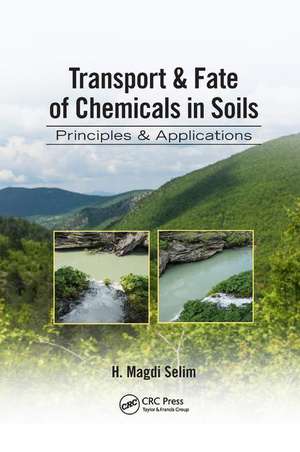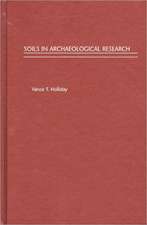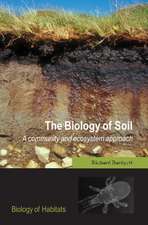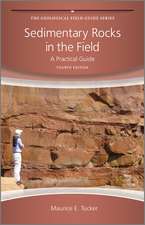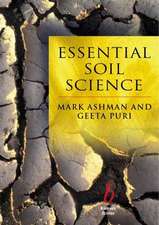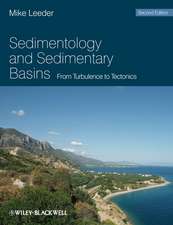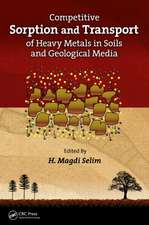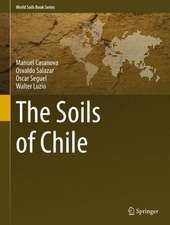Transport & Fate of Chemicals in Soils: Principles & Applications
Autor H. Magdi Selimen Limba Engleză Paperback – 22 noi 2017
The book provides the basic framework of the principals governing the sorption and transport of chemicalsin soils. It focuses on physical processes such as fractured media, multiregion, multiple porosities, and heterogeneity and effect of scale as well as chemical processes such as nonlinear kinetics, release and desorption hysteresis, multisite and multireaction reactions, and competitive-type reactions. The coverage also includes details of sorption behavior of chemicals with soil matrix surfaces as well the integration of sorption characteristics with mechanisms that govern solute transport in soils. The discussions of applications of the principles of sorption and transport are not restricted to contaminants, but also include nitrogen, phosphorus, and trace elements including essential micronutrients, heavy metals, military explosives, pesticides, and radionuclides.
Written in a very clear and easy-to-follow language by a pioneer in soil science, this book details the basic framework of the physical and chemical processes governing the transport of contaminants, trace elements, and heavy metals in soils. Highly practical, it includes laboratory methods, examples, and empirical formulations. The approach taken by the author gives you not only the fundamentals of understanding of reactive chemicals retention and their transport in soils and aquifers, but practical guidance you can put to immediate use in designing experiments and collecting data.
| Toate formatele și edițiile | Preț | Express |
|---|---|---|
| Paperback (1) | 456.63 lei 6-8 săpt. | |
| CRC Press – 22 noi 2017 | 456.63 lei 6-8 săpt. | |
| Hardback (1) | 1101.06 lei 6-8 săpt. | |
| CRC Press – 17 sep 2014 | 1101.06 lei 6-8 săpt. |
Preț: 456.63 lei
Preț vechi: 590.26 lei
-23% Nou
Puncte Express: 685
Preț estimativ în valută:
87.38€ • 90.68$ • 73.04£
87.38€ • 90.68$ • 73.04£
Carte tipărită la comandă
Livrare economică 17-31 martie
Preluare comenzi: 021 569.72.76
Specificații
ISBN-13: 9781138075924
ISBN-10: 1138075922
Pagini: 352
Ilustrații: 397; 16 Tables, black and white; 202 Illustrations, black and white
Dimensiuni: 156 x 234 x 24 mm
Greutate: 0.45 kg
Ediția:1
Editura: CRC Press
Colecția CRC Press
ISBN-10: 1138075922
Pagini: 352
Ilustrații: 397; 16 Tables, black and white; 202 Illustrations, black and white
Dimensiuni: 156 x 234 x 24 mm
Greutate: 0.45 kg
Ediția:1
Editura: CRC Press
Colecția CRC Press
Public țintă
Academic and Professional Practice & DevelopmentCuprins
Soil-Chemical Interaction: Basic concept. Transport of Reactive Chemicals in soils: Basic concept. The Chemical Equilibrium in Approaches. The Multi-Reaction Transport Model (MRTM). The Second-Order Transport Model (SOTS). The mobile-immobile Chemical non-equilibrium model (MIM). Simulation of multiple chemical species in soils. Simulation of chemicals in heterogeneous media. Conclusion.
Notă biografică
H. Magdi Selim is Professor of Soil Physics and George and Mildred Caldwell Endowed Professor of Soil Science, School of Plant, Environmental and Soil Sciences at Louisiana State University at Baton Rouge. He received his B.S. degree in Soil Science from Alexandria University, Alexandria, Egypt, and his M.S. and Ph.D. in Soil Physics from Iowa State University, Ames, Iowa. Professor Selim is internationally recognized for his research in the areas of transport and kinetics of reactive chemicals in heterogeneous porous media and modeling of dissolved chemicals in water-saturated and unsaturated soils. He is the original developer of several conceptual models for describing the retention processes of dissolved chemicals in soils and natural materials in porous media. Pioneering work also include two-site and
multireaction and nonlinear kinetic models for trace elements, heavy metals, radio-nuclides, explosive contaminants, phosphorus and pesticides in soils and geological media.
Professor Selim is the author or coauthor of numerous scientific publications in several journals. He is author and co-author of several books. He is a member of the American Society of Agronomy, Soil Science Society of America, International Society of Soil Science, International Society of Trace Element Biogeochemistry, Louisiana Association of Agronomy, and American Society of Sugarcane Technology. Dr. Selim was elected chair of the Soil Physics Division of the Soil Science Society of America. He served on numerous committees of the Soil Science Society of America, American Society of Agronomy, and the International Society of Trace Element Biogeochemistry. He also served as associate editor of Water Resources Research and the Soil Science Society of America Journal and as Technical Editor of the Journal of Environmental Quality.
Professor Selim is a Fellow of the American Society of Agronomy and the Soil Science Society of America. Dr. Selim is the recipient of several professional awards and honors. Awards received include Phi Kappa Phi Research, Gamma Sigma Delta Award for Research, Joe Sedberry Graduate Teaching Award, First Mississippi Research Award, Doyle Chambers Achievements Award, and EPA Environmental Excellence Award. Recent awards include the Soil Science Research Award from the Soil Science Society of America (SSSA) and von Liebeg Award from the International Union of Soil Science (IUSS).
multireaction and nonlinear kinetic models for trace elements, heavy metals, radio-nuclides, explosive contaminants, phosphorus and pesticides in soils and geological media.
Professor Selim is the author or coauthor of numerous scientific publications in several journals. He is author and co-author of several books. He is a member of the American Society of Agronomy, Soil Science Society of America, International Society of Soil Science, International Society of Trace Element Biogeochemistry, Louisiana Association of Agronomy, and American Society of Sugarcane Technology. Dr. Selim was elected chair of the Soil Physics Division of the Soil Science Society of America. He served on numerous committees of the Soil Science Society of America, American Society of Agronomy, and the International Society of Trace Element Biogeochemistry. He also served as associate editor of Water Resources Research and the Soil Science Society of America Journal and as Technical Editor of the Journal of Environmental Quality.
Professor Selim is a Fellow of the American Society of Agronomy and the Soil Science Society of America. Dr. Selim is the recipient of several professional awards and honors. Awards received include Phi Kappa Phi Research, Gamma Sigma Delta Award for Research, Joe Sedberry Graduate Teaching Award, First Mississippi Research Award, Doyle Chambers Achievements Award, and EPA Environmental Excellence Award. Recent awards include the Soil Science Research Award from the Soil Science Society of America (SSSA) and von Liebeg Award from the International Union of Soil Science (IUSS).
Recenzii
"Highly practical… includes laboratory methods, examples, and empirical formulations."
—International Journal of Environmental Analytical Chemistry, 2015
"[This] new book by H. Magdi Selim, makes an important contribution to the available literature concerning the fate and transport of solutes in the soil environment. The text is ideal for use in both graduate and undergraduate instruction in a range of disciplines beyond soil science, and as a standard reference guide for many researchers and environmental practitioners interested in this field. A unique aspect of the text is the discussion of laboratory methods by which solute transport and partitioning properties are obtained, rather than focusing solely on an understanding of conceptual issues and modeling approaches."
—John C. Seaman, Savannah River Eco. Lab, University of Georgia, Athens, USA
"The significance and extent of chemicals in our environment demand concerted attention for purposes of understanding, management, and remediation. This book contributes greatly to each of these purposes. …Professor Selim has written this important book, which I highly recommend to all scientists and engineers interested in chemicals in the natural environment."
—Robert Horton, Iowa State University, Ames, USA
"Highly practical… includes laboratory methods, examples, and empirical formulations."
—International Journal of Environmental Analytical Chemistry, 2015
"[This] new book by H. Magdi Selim, makes an important contribution to the available literature concerning the fate and transport of solutes in the soil environment. The text is ideal for use in both graduate and undergraduate instruction in a range of disciplines beyond soil science, and as a standard reference guide for many researchers and environmental practitioners interested in this field. A unique aspect of the text is the discussion of laboratory methods by which solute transport and partitioning properties are obtained, rather than focusing solely on an understanding of conceptual issues and modeling approaches."
—John C. Seaman, Savannah River Eco. Lab, University of Georgia, Athens, USA
"The significance and extent of chemicals in our environment demand concerted attention for purposes of understanding, management, and remediation. This book contributes greatly to each of these purposes. …Professor Selim has written this important book, which I highly recommend to all scientists and engineers interested in chemicals in the natural environment."
—Robert Horton, Iowa State University, Ames, USA
"… invaluable to students and professionals in soil and environmental sciences, environmental engineering, and hydrology, and other allied fields. Clear discussions on contaminant processes are included as well as kinetic based models that can be used to predict contaminant fate and transport over various temporal scales. In addition to principles, that are included for each topic, applications, to relate the results to real world scenarios, are presented. I highly recommend this timely and important book."
— Donald L. Sparks, Director, Delaware Environmental Institute (DENIN), University of Delaware
"… a comprehensive introduction and overview on physico-chemical approaches used to describe and model solute transport in soils and how it is affected by sorption to the solid matrix and exchange among pore space domains of contrasting mobility. The value of the book is furthermore greatly enhanced by the endeavor of the author to link the presented concepts to application. In addition to describing and discussing the methods used to determine model parameters, the book also gives a wealth of data relating parameter values to soil types and properties. Thus, it is not only most useful for students and advanced scientists looking for a concise introduction into soil solute sorption and transport principles and an overview over the state of the art in this field, but is also for practitioners as a valuable source of information needed for practical applications of transport models."
—Rainer Schulin, ETH Zurich, Switzerland
—International Journal of Environmental Analytical Chemistry, 2015
"[This] new book by H. Magdi Selim, makes an important contribution to the available literature concerning the fate and transport of solutes in the soil environment. The text is ideal for use in both graduate and undergraduate instruction in a range of disciplines beyond soil science, and as a standard reference guide for many researchers and environmental practitioners interested in this field. A unique aspect of the text is the discussion of laboratory methods by which solute transport and partitioning properties are obtained, rather than focusing solely on an understanding of conceptual issues and modeling approaches."
—John C. Seaman, Savannah River Eco. Lab, University of Georgia, Athens, USA
"The significance and extent of chemicals in our environment demand concerted attention for purposes of understanding, management, and remediation. This book contributes greatly to each of these purposes. …Professor Selim has written this important book, which I highly recommend to all scientists and engineers interested in chemicals in the natural environment."
—Robert Horton, Iowa State University, Ames, USA
"Highly practical… includes laboratory methods, examples, and empirical formulations."
—International Journal of Environmental Analytical Chemistry, 2015
"[This] new book by H. Magdi Selim, makes an important contribution to the available literature concerning the fate and transport of solutes in the soil environment. The text is ideal for use in both graduate and undergraduate instruction in a range of disciplines beyond soil science, and as a standard reference guide for many researchers and environmental practitioners interested in this field. A unique aspect of the text is the discussion of laboratory methods by which solute transport and partitioning properties are obtained, rather than focusing solely on an understanding of conceptual issues and modeling approaches."
—John C. Seaman, Savannah River Eco. Lab, University of Georgia, Athens, USA
"The significance and extent of chemicals in our environment demand concerted attention for purposes of understanding, management, and remediation. This book contributes greatly to each of these purposes. …Professor Selim has written this important book, which I highly recommend to all scientists and engineers interested in chemicals in the natural environment."
—Robert Horton, Iowa State University, Ames, USA
"… invaluable to students and professionals in soil and environmental sciences, environmental engineering, and hydrology, and other allied fields. Clear discussions on contaminant processes are included as well as kinetic based models that can be used to predict contaminant fate and transport over various temporal scales. In addition to principles, that are included for each topic, applications, to relate the results to real world scenarios, are presented. I highly recommend this timely and important book."
— Donald L. Sparks, Director, Delaware Environmental Institute (DENIN), University of Delaware
"… a comprehensive introduction and overview on physico-chemical approaches used to describe and model solute transport in soils and how it is affected by sorption to the solid matrix and exchange among pore space domains of contrasting mobility. The value of the book is furthermore greatly enhanced by the endeavor of the author to link the presented concepts to application. In addition to describing and discussing the methods used to determine model parameters, the book also gives a wealth of data relating parameter values to soil types and properties. Thus, it is not only most useful for students and advanced scientists looking for a concise introduction into soil solute sorption and transport principles and an overview over the state of the art in this field, but is also for practitioners as a valuable source of information needed for practical applications of transport models."
—Rainer Schulin, ETH Zurich, Switzerland
Descriere
This book provides the fundamentals for the understanding of reactive chemicals retention and their transport in soils and aquifers. The book offers the first comprehensive treatment with supporting examples of mathematical models that describe contaminants reactivity and transport in soils and aquifers. It is also a practical guide for designing experiments and collecting data that focuses on characterizing retention as well as release kinetic reactions in soils and contaminant transport experiments in the laboratory, greenhouse (column) and in the field.
